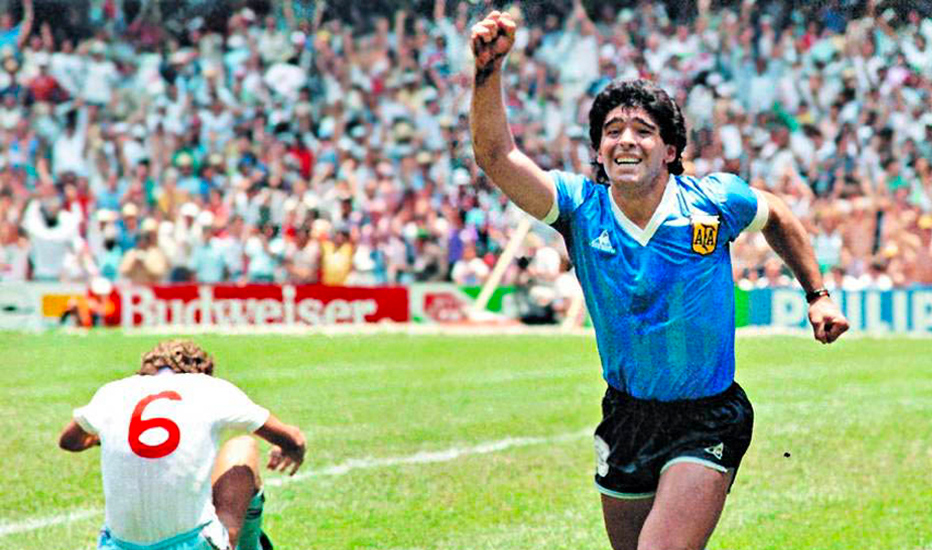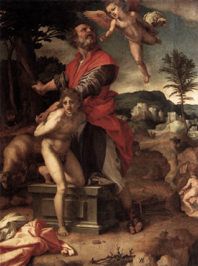Born and raised in Buenos Aires, Argentina, on October 30, 1961, Diego Armando Maradona began his football career at the age of nine and played for Argentinos Juniors’ youth team, “Los Cebollitas” or “The Little Onions,” which he carried into a 136 consecutive win steak. Known for his incredible speed and control of the football, Maradona quickly earned a positive reputation and was quickly promoted to the first team created by Argentinos Juniors at the age of fourteen. Ultimately, it only took him a single year to make his first professional debut at the age fifteen. After four months of stunning a whole country, Maradona was called up to the Argentinian national team and became the youngest Argentine to ever debut, being only sisteen years of age at the time.1 Due to his high performance in Argentinos Juniors, including 116 goals in 167 games, he was signed by the most dominating side in Argentina, Boca Juniors. After years of impressive numbers in the first division in Argentina, Maradona migrated to Europe to showcase his talents in the big leagues. Maradona rapidly earned a positive reputation while playing overseas and captivated football fans, some of whom would later consider him to be the best footballer on the planet, higher than even the Brazilian legend, Pele.2 He went on to sign for FC Barcelona the year after signing to Boca Juniors to test his luck on European soil. While at Barcelona, Maradona shocked the world by delivering unthinkable skills and goals, but there was only one issue: Maradona did not have a good relationship with the appointed president of FC Barcelona, Nunez, who proceeded to sell Diego to Napoli in 1984. To many, Napoli was a set back for Maradona’s career, but the talented footballer went on to carry this new Italian team to great heights by giving the team an identity and earning positive reputation for himself.3

After Maradona—and, indeed, the nation of Argentina itself—suffered a moral setback in the 1982 World Cup for their failure to advance to the knock-out stages, revenge was around the corner as the whole country was eager and had high hopes for the team that had arguably the greatest player alive in their squad. As a result of their belief, July 22, 1986 became the date and the setting that would be celebrated by many, agonized over by others, but remembered by all. The time was 12:00 PM in Estadio Azteca, Mexico City. The 1986 World Cup Quarter Finals featured international giants England and Argentina, and high expectations were set since both of these teams had world-class squads, with players such as Gary Lineker and John Barnes representing England, and Jorge Burruchaga and Diego Armando Maradona backing up Argentina. It was more than obvious that it was going to be a game remembered by the world of football regardless of who was crowned winner in the end.4
The whistle blew and kickoff was underway. Maradona, Captain of the Argentinian national team, knew that he had the responsibility and obligation to deliver throughout the world cup. The first half was an even matchup between both sides, and although Argentina had more possession of the football than England, there were a considerable number of chances that were not properly taken, and therefore no goals were made. Having Maradona on the Argentinian side was an apparent advantage because even though neither side scored in the first half, it was Maradona that often gave signs of real danger to the opposing team. Many knew what Maradona was capable of, but they never imagined the type of performance he was going to give, especially on the biggest stage of them all with all of the pressure and responsibility that came with being the captain of a nation that breathes football.
Argentina’s great superiority would be introduced in the second half. An inspired Diego Armando Maradona was poised to unleash his talents in order to change football history forever. In the 50th minute of the match, the football was in Maradona’s possession and the Argentinian genius showed his skill by passing up Glenn Hoddle, squeezing through two more English footballers and passing the ball to his teammate Valdano, who was beaten by another Englishman. However, the Englishman poorly cleared the ball, resulting in a perfect cross to Maradona, who, noticing he did not have enough height to head the ball in, appropriately used his hand to punch the ball in, beating the English keeper Shilton. It was a clear hand ball, which occurs when a player other than the goalkeeper deliberately handles the ball while still in play; but the referee did not see it and gave the goal to Argentina. Eventually, it became known as “The Hand Of God,” because many believed that it was God who put the ball into the net and gave Argentina the goal. Maradona was later questioned about this incident, and about the popular name that was given to the goal in an interview, where he responded by saying “Of course, it was not the hand of God. It was me. A lot goes on in a game, and I am cunning. I know what I have to do, and that time I was very lucky.”5 While many protests by the English side were received, nobody saw the controversy apparent in the incident, at least not for a while. In fact, Barry Davies, an English commentator, questioned the protests by the English side because he thought they were protesting an offside from Maradona, although they blamed the English defender, who, in their eyes, had poorly cleared the ball. “When celebrating the goal, Maradona did not show any doubt that it was a goal other than a few glances at the officials so he could sell it to them because he knew it was not valid.”


Despite the injustice done to England, the show went on. England knew they could not get distracted and quickly pressed forward to find a quick response to the inequity done to them, but an inspired Maradona was not going to let this happen. It was the 55th minute, Maradona received the football halfway through the pitch and began his sprint by taking a first touch, avoiding one opponent and rolling the ball back in order to spin it away towards the right touchline, and sped off, passing famous English footballer Peter Reid as he crossed the halfway line. As Maradona cut inside the English box, he met up with Defender Terry Butcher, who could only swing his leg in hopes that he would get the ball, ultimately failing to do so. Diego approached the box and passed Terry Fenwick, who tried fouling him, to no avail. The ball later passed English goalkeeper Shilton. This goal was, to many fans, the best goal in the history of football because of its beauty and importance. It was this goal that set a cold-blooded Maradona apart from the rest of the players in the world, as he had proved that he had the ability to carry his team to victory, a notion that also gave his teammates confidence to also perform at a greater level.6

In an attempted effort to change the result and scenario of the game, England brought in John Barnes to the war that seemed already impossible to win due to the limited amount of time left in the game and the immense amount of pressure that the English players had. Although the team only had nine minutes remaining in the match, Barnes quickly gave a cross assist to Gary Lineker, who just had to tap it in the net with his head in the 81st minute. This goal was a sign of hope for England, whose players were eager to tie the match due to the impotency and unfair nature of it. Although Lineker’s 6th goal of the competition ensured his position as top goal-scorer of the world cup, it was unfortunately not enough to avoid the defeat against the Argentinian side and Maradona. Thanks to Maradona’s “Hand Of God” play, Argentina went through to the semifinals, defeated Belgium and later wrote history when they were crowned champions of the world cup by defeating West Germany 3-2. Maradona’s legacy will live forever in the world of football, and, although it was an enormous injustice to England, it was undeniable that Maradona’s performance in this match set him apart from every footballer alive at the time, and that Argentina were worthy of coming out with the victory in the end.
- Marco Risi, Maradona, the Hand of God (Santa Monica: Xenon Pictures, 2008), 1. ↵
- Saura Bhattacharjee, “Pele vs. Maradona : A Hot Discussion on Who Was Greater of the Two,” Bleacher Report (blog), September 27, 2017, https://bleacherreport.com/articles/460039-pele-vs-maradona-a-hot-discussion-on-who-was-greater-of-the-two. ↵
- John Molinaria, “History of the World Cup: 1986 – Maradona Puts on a Show in Mexico,” Sports Net (blog), 2018, https://www.sportsnet.ca/soccer/1986-world-cup-maradona-puts-on-one-man-show/ ↵
- Peter Jardine, “Terry Butcher Still Haunted by Maradona’s Hand of God,” Daily Mail Online (blog), November 18, 2008, https://www.dailymail.co.uk/sport/football/article-1086892/Terry-Butcher-haunted-Maradonas-Hand-God.html. ↵
- “Argentina’s Diego Maradona Admits That He Cheated in World Cup Match,” Los Angeles Times, November 17, 1986, https://www.latimes.com. ↵
- Chase Early, “June 22, 1986: Maradona Crushes England’s World Cup Dreams with the Hand of God Goal,” BT (blog), 2018, https://home.bt.com/news/on-this-day/june-22-1986-maradona-crushes-englands-world-cup-dreams-with-the-hand-of-god-goal-11363987776772. ↵



44 comments
Kimberly Parker
Growing up, I had always heard of Maradona, due to the fact that that was what most of my mom’s side of the family would talk about. I would sit there and listen, but I wouldn’t be that interested because I wasn’t that much into soccer. When I saw this article, I was intrigued to see what it would be about, and what “the hand of God” would mean. Learning that it was a play, that basically went down in history due to the fact that he quite literally punched the ball into the net, is mind-blowing, and that he also joined the Argentinian national league at just the age of 16, is a great accomplishment. This article was very informative, and I feel a lot closer to some of the history of the team of my country.
Jose Chaman
This is a great story, I have heard a lot about Maradona’s football legacy, probably because I am from Latin America. Maradona was a soccer genius, he carried the talent in his veins. I could not imagine how great he was to be selected to play with the Argentinian National League at the age of 16! Just incredible. Although this is a great story, the fact that Argentina won because of this fraudulent movement remembered as “The Hand of God” is not something to be proud with. I will always vote for fair games and in this case, I am on the side of England.
Kenneth Gilley
This was a very interesting article. It is amazing the prowess Diego Armando Maradona showed in his youth. His becoming part of the Argentinian national league at only 16 is incredible. His “Hand of God” play was definitely a historic one. You have to feel bad for England. Losing that game because Maradona got away with a cheat must have been terribly disheartening.
Rosa Robledo Martinez
Before reading this article I didn’t know the meaning of “the hand of god” , but as a kid I played soccer and I remeber eveyone screaming it when someone tried to make a corner kick. After understanding the meaning I am devasted that England basically got cheated on. I think if Argentina wanted to win, they should have played by the book. I feel like that goal shouln’t have never counted, due to so much controversy amongst the teams and the fact he basically punched the ball right in the net. If this wouldn’t have happen in my opinion England would have won the world cup.
Mauro Bustamante
I believe that this article shows you how Maradona did all that he could do -also things that are not permitted in a soccer match- in order beat the England soccer team. You feel for England who essentially got robbed but Maradona knowing that this might be Argentina’s only chance to win he did, it is an infamous play which in some ways you appreciate and for some reasons despise. Playing against grown men at that age you’re almost at every disadvantage in experience, speed, and strength but somehow he was able to compete with them. This was an enjoyable article to read since I’ve always loved the sport!
Pablo Ruiz
I have always known about the “Hand of God.” As a child the story of Maradona using his hand to score a goal which would end up helping them win the game always shocked me because it was done on the largest soccer platform of the world. In today’s game there is no way for players to be clever like this because of a new rule called VAR or video assistant review which allows refs to watch replays to make calls. None the less i applaud Maradona for being clever and securing his teams future to end up winning the World Cup.
Bruno Lezama
I find this article interesting. I used to say “Hand of God” each time that I touched the ball with my hand while playing soccer with my friends. However, I didn’t know too much about the history of “Hand of God.” I believe that this article shows you how Maradona did all that he could do -also things that are not permitted in a soccer match- in order beat the England soccer team. I disagree about what Maradona did. I think that you must win a game -or a match in this case- following the rules of the game. I find this unfair for the England team.
Carlos Tami
Growing up playing soccer you always heard the term “hand of god” and sometimes we would try to recreate that historic event. It can be debated whether he was a cheater or if he would do anything to win the match, something that is highly valued among soccer coaches, ruthlessness to win. I never really knew much about Maradona aside from him being considered one of the greatest players in the world, but learning that his first professional debut was at the age of fifteen is shocking. That is amazing, when I was 15 I was playing against 15 year olds, I couldn’t fathom playing against grown men at that age. You’re almost at every disadvantage in experience, speed, and strength but somehow he was able to compete with them. This was an enjoyable article to read since I’ve always loved the sport!
Marco Monte de Oca
This article really gave me an understanding of the beginning of Maradona’s career. I never knew he won 136 straight games at the youth level, that is an unbelievable record. The way you first described the Argentina vs England game as, “celebrated by many, agonized over by others, but remembered by all” is the perfect way to describe it. I know a lot about this moment since I’m a big fan of soccer, but I have never heard this moment described in a better way. This game will go down as one of the most well-known games ever, because of the injustice from the first goal and the moment of magic produced for the second goal.
Juan Arceo
Diego Maradona will always be one of the Greatest player of all time, if not the best. I have always followed Mexico’s national soccer team as a kid, but I have loved the way that Argentina plays whenever it is a world cup match of just a friendly match to qualify. I have heard about the “Hand of God” but never really paid attention to it, but thanks to this article I got a clear understanding of it and the overall climb of Maradona’s career such as when he started out in “Las Cebollitas” and how he was the youngest to start for Argentina at 16. In any match, a handball is not acceptable, but what Maradona did in the grandest stage of them all, goes to show much he loved the game, sure it wasn’t the correct thing to do, but that play will always cement his legacy as one of the best to ever do it. P.S. Sorry England about the loss